New rye detection method developed
- Like
- Digg
- Del
- Tumblr
- VKontakte
- Buffer
- Love This
- Odnoklassniki
- Meneame
- Blogger
- Amazon
- Yahoo Mail
- Gmail
- AOL
- Newsvine
- HackerNews
- Evernote
- MySpace
- Mail.ru
- Viadeo
- Line
- Comments
- Yummly
- SMS
- Viber
- Telegram
- Subscribe
- Skype
- Facebook Messenger
- Kakao
- LiveJournal
- Yammer
- Edgar
- Fintel
- Mix
- Instapaper
- Copy Link
Posted: 19 August 2019 | Rachael Harper (New Food Magazine) | No comments yet
A new method for detecting rye in food could help manufacturers meet regulatory requirements for ‘gluten-free’ claims on foods.


Researchers have developed a method to detect proteins from rye, which could help food manufacturers meet regulatory requirements for ‘gluten-free‘ claims on foods.
Although many foods with ‘gluten-free’ labels are now available, some might contain trace amounts of grains that could cause problems for those with celiac disease.
Scientists have already developed mass-spectrometry-based approaches to detect gluten proteins specific to wheat and barley, but researchers Michelle Colgrave and Commonwealth Scientific and Industrial Research Organisation (CSIRO) colleagues wanted to identify gluten and other proteins from a less well-studied grain: rye.
To do this, they obtained 20 varieties of rye from 12 different countries, which they milled and treated with a solution that selectively extracted gluten proteins. Then, they used mass spectrometry to identify and quantify peptides, or protein fragments, from each sample., which revealed six peptides that were detected in all rye varieties but not in other grains.


The new method found that a ‘gluten-free’ breakfast cereal had trace amounts of rye that were not disclosed on the ingredients list.
The researchers then analysed several commercial flours, breakfast cereals and snack foods and detected the six rye peptides in all foods that contained it as a labeled ingredient. In addition, one sample of flour from a wheat-related grain called spelt was contaminated with about 2 percent rye, and a ‘gluten-free’ breakfast cereal had trace amounts of rye that were not disclosed on the ingredients list.
The rye-specific peptide markers will complement those already developed for wheat and barley, providing the ability to detect all gluten-containing grains, the researchers say.
The study from the American Chemical Society was published in the Journal of Proteome Research.
Related topics
Health & Nutrition, Packaging & Labelling, Research & development, The consumer
Related organisations
American Chemical Society, Commonwealth Scientific and Industrial Research Organisation









